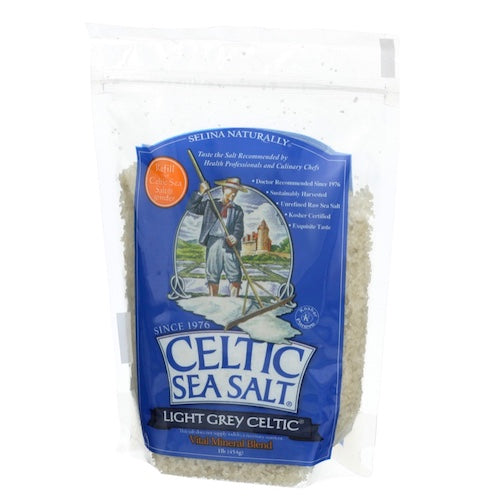1
/
of
1
CELTIC SEA SALT, UNREFINED, LIGHT GREY, COARSE, 1 LB BAG
CELTIC SEA SALT, UNREFINED, LIGHT GREY, COARSE, 1 LB BAG
Regular price
$7.95
Regular price
Sale price
$7.95
Unit price
/
per
Transport calculated at checkout.
Co-op Pickup Availability:
102 Available
Shipping Availability:
Couldn't load pickup availability
Item Description
A word about refined salt
Salt is necessary for life. But just like refined sugar, table salt has been stripped of the very nutrients your body needs in order to use the salt itself. Instead of benefiting your body, table salt upsets the natural balance of fluids in your cells and actually dehydrates your body by pulling water out of the cells and tissues. That's why you feel so thirsty after eating a salty meal.
Common table salt is 97.5% pure sodium chloride. The remaining 2.5% is composed of chemicals such as aluminum based anti-caking agents and iodine. (What's worse, the anti-caking agents are not required to be listed on the label.)
Even most sea salts are refined
There is very little difference between ordinary table salt and most sea salts. Just because a salt originated in the sea doesn't guarantee that processors haven't stripped it of its nutrients, and unfortunately, most of them have. Refined sea salt is stark white, just like table salt, and it is almost entirely sodium chloride, nearly 99%, if not more.
Be sure to look at your favorite salt's package label. It shouldn't be pure (or almost pure) sodium chloride. Instead, you should see a long list of minerals.
Unrefined Celtic Sea Salt
Celtic Sea Salt is entirely an unrefined salt. It is made up of only 85% sodium chloride. The remaining 15% is made up of over 60 trace minerals. This is the same balance found in pure ocean water. Nothing has been added to Celtic Sea Salt, and nothing has been removed, well, except for the water which is evaporated naturally by the sun.
Unrefined salt is always some kind of color, never stark white. Natural salts range from pinkish to gray, and some are actually blackish. The color depends on the type of minerals in the salt and their proportions. Celtic Sea Salt is light gray.
Celtic Sea Salt is moist, too. The moisture actually locks in some of the minerals, so it's best not to let this natural sea salt dry out.
The flavor of Celtic Sea Salt is much better than the taste of refined salt. Much, much better. Instead of the chemical/salty flavor of refined salt, the taste of Celtic Salt is full and almost sweet.

Coarse Celtic Sea Salt
If you've checked the price, you probably noticed that coarse Celtic Sea Salt, otherwise known as 'light gray' Celtic Salt, is nearly half the price of the fine ground Celtic Salt. We take advantage of this price difference and generally buy the coarse stuff. It's easy to add to soups and almost any liquid recipe. It doesn't dissolve well in gravy, though, or other fatty liquids, so it's best to use Fine Celtic Sea Salt or grind your own.
A mortar and pestle or suribachi makes quick work of grinding coarse salt so you can use it in baking too. (And kids think this is great fun!)

And for adding salt at the table, we use the Kyocera (pronounced kee o SEE ra) salt grinder. (The same ceramic grinder comes in black too, which is nice for fresh cracked pepper at the table.) It's very important that you use a ceramic salt grinder because natural salts don't have additives to keep them from absorbing moisture, and the moisture in Celtic Salt will quickly corrode a salt grinder that has metal parts. We've used our salt grinder for at least 8 years now, and even with 5 children handling it regularly, we haven't had any problems with it. (Haven't broken it either - it's pretty tough glass!)
One more reason to use the coarse Celtic Salt: it's more moist than the fine ground version. Because moisture locks in some of the minerals, the coarse salt retains a slightly higher amount of minerals than fine ground Celtic Salt.
Share


